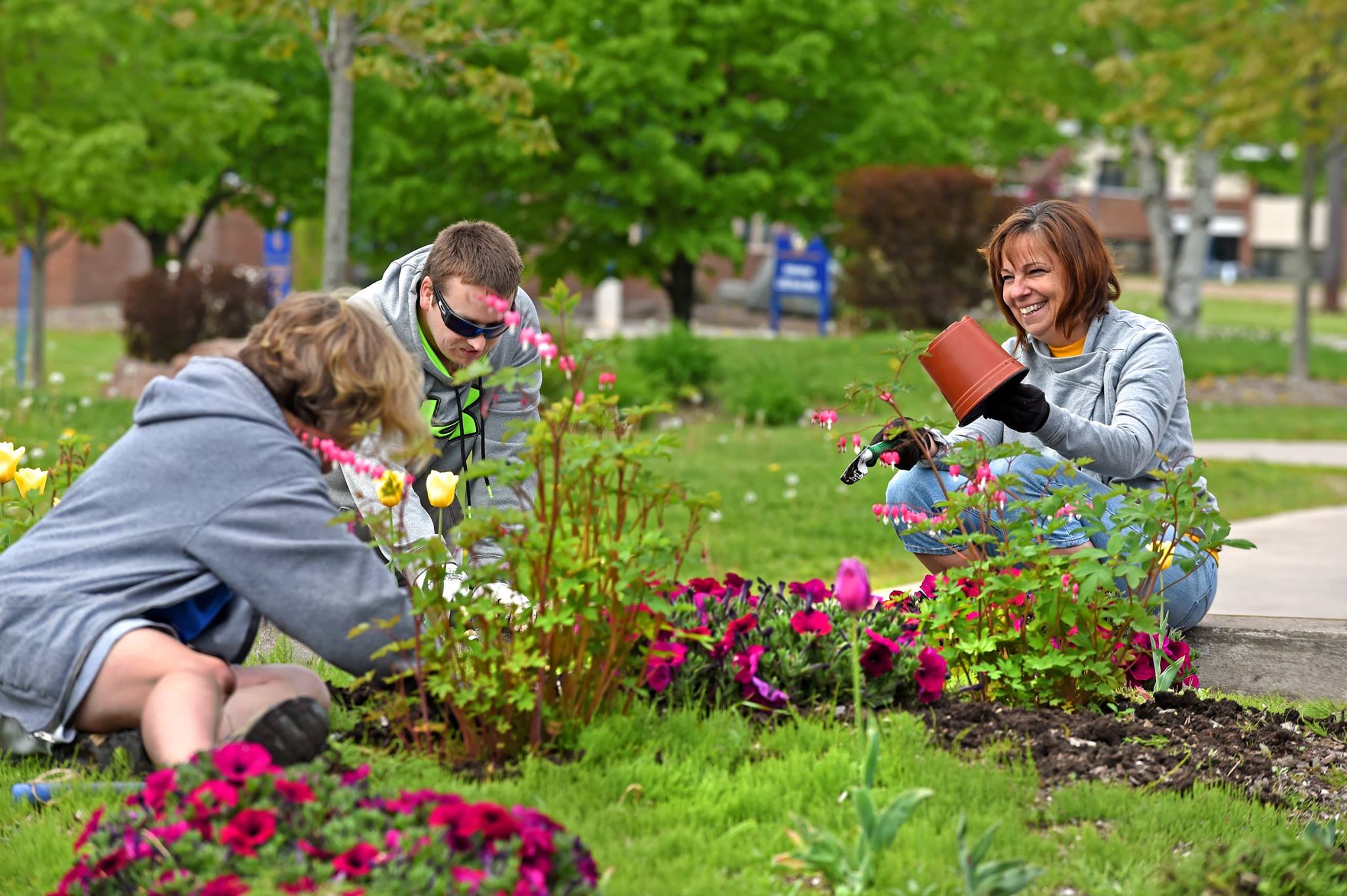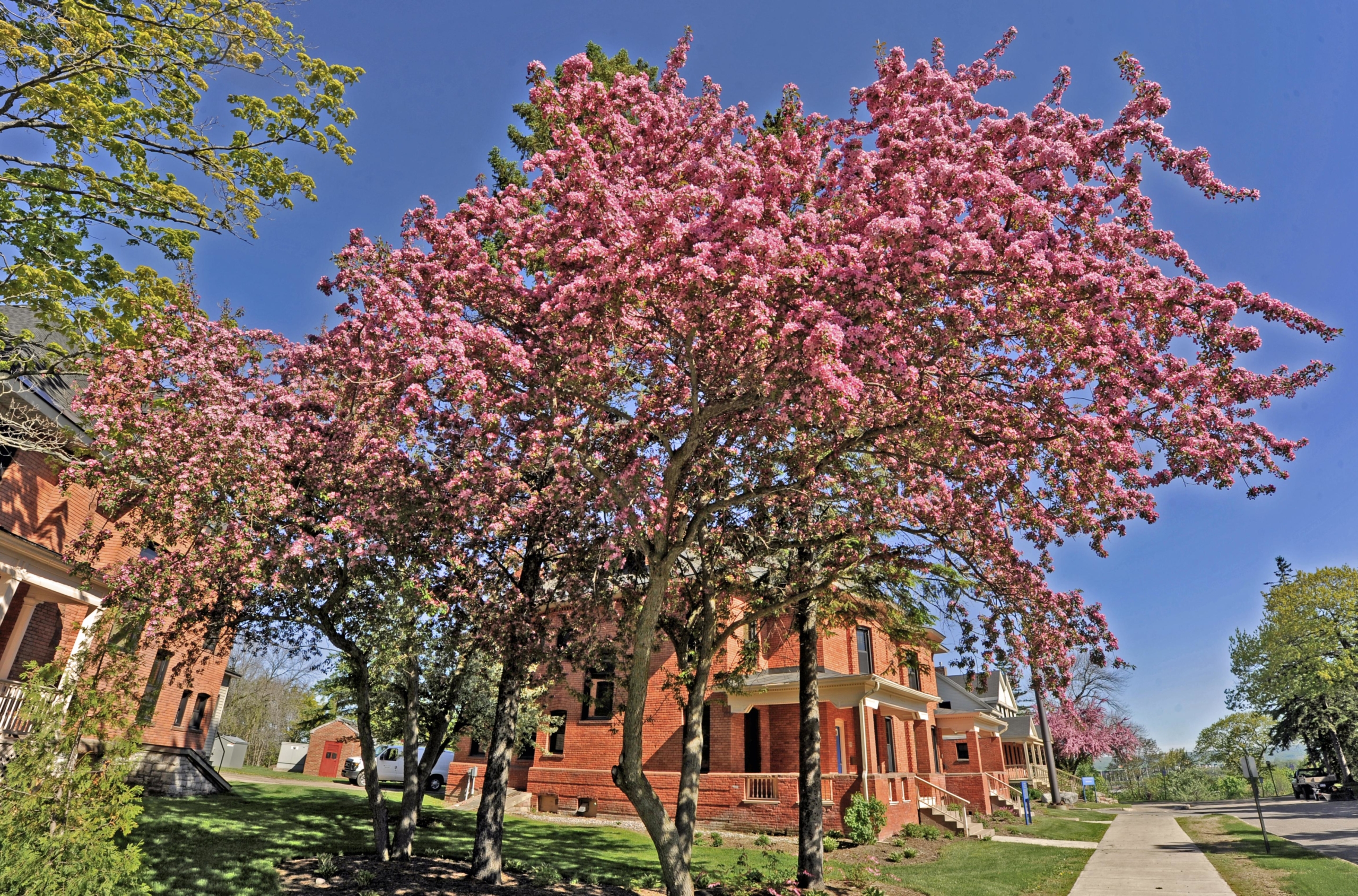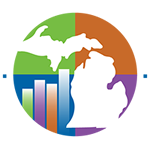Facilities
 Lake Superior State University is committed to this policy of energy efficiency, energy conservation, and the reduction of our environmental impact, particularly during this time of increased environmental awareness, rising utility costs, tighter budgets, and new construction on campus. The goal of the policy is to create a realistic and comprehensive document that identifies energy and water conservation and efficiency as significant issues for the entire campus community as well as developing better ways to operate to reduce our environmental impact. This document details steps that will be taken to address these issues and reach the goals of the university. This policy will be reviewed and updated periodically as public awareness, management techniques and technologies change.
Lake Superior State University is committed to this policy of energy efficiency, energy conservation, and the reduction of our environmental impact, particularly during this time of increased environmental awareness, rising utility costs, tighter budgets, and new construction on campus. The goal of the policy is to create a realistic and comprehensive document that identifies energy and water conservation and efficiency as significant issues for the entire campus community as well as developing better ways to operate to reduce our environmental impact. This document details steps that will be taken to address these issues and reach the goals of the university. This policy will be reviewed and updated periodically as public awareness, management techniques and technologies change.
Suggestions
Any suggestions for ways of reducing energy consumption on campus should be addressed to the Energy Director (Jim Becsey, ).
Conservation Goals
LSSU has taken various measures over the years to conserve energy. In 2019, the university entered a $23.6M performance contract with Johnson Controls for an enterprise-wide energy plan. Building envelops, roofs, and related energy loss mechanisms were also addressed in the performance contract. Expected yearly energy reductions for each structure were also determined. Water, gas, and electric meters were installed, and energy usage will be monitored beginning in 2020.
Buildings
- Windows and doors of the conditioned spaces should be kept closed.
- Personal computers, other office equipment, lighted, window air conditioners and personal heaters should be turned off when not in use.
- The use of personal heaters and air conditioners is discouraged (unless some unforeseen medical reason exists).
- Power management features of personal computers should be enabled.
- As time and funding allow, the buildings and the mechanical systems will be connected to the campus-wide energy management system (Johnson Controls). This will permit greater control over operating schedules and temperatures, will reduce energy cost.
New Renovation & Construction
All new renovations and construction should be designed and built to minimize energy use.
- The most recent version of ASHRAE Standard 90.1-2013 should be set as the minimum energy efficiency guideline, since it has been shown that further reductions in energy use are economically achievable.
- All construction efforts should consider LEED criterion applicability and application where warranted and possible.
- The design process should include energy life cycle costing analyses.
- New construction should be added to campus-wide energy management system (Johnson Controls) for enhanced energy management capabilities.
- Alternative energy sources such as solar (thermal and photovoltaic), wind, biomass, biofuels, hydro (conventional and low-head), co-generation, and energy recovery should be considered, as well as delighting and other strategies for decreasing building energy consumption.
- Primary consideration should be given to connecting and/or extending central systems for heating, cooling and other mechanical systems.
- Year-round cooling needs should be met by utilizing the most energy efficient systems (“best available technology”).
- All new construction should include utility metering (electricity, natural gas, steam, and water).
Lighting
- Most lighting on campus is being retrofitted or upgraded to high efficiency lighting (LED technology) with electronic ballasts. Remaining areas should be upgraded as funding is available.
- New construction and remodels should use high efficiency lighting and minimum incandescent lighting.
- Interior decorative lighting should be kept at a minimum and exterior decorative lighting should be discouraged.
- Lighting levels recommended by Illuminating Engineering Society Lighting Handbook should be used as guidelines to avoid over-lit spaces.
- Increased use of day lighting and delighting controls should be considered because use of daylight spaces decreases energy costs and may improve productivity.
- Lighting, wherever practical, should be controlled by our campus-wide energy management system (Johnson Controls). Occupancy times, unoccupied period set-backs, and environmental parameters, as well as campus-related (and athletic) activities will be coordinated to ensure that the best possible use (or conservation) of resources is taking place.
Heating/Cooling
Heating
During the heating seasons, room temperatures should be maintained at between 68 and 70 degrees F when occupied. Whenever it is economically and technically feasible, night setback features of the BACS system will utilized to allow temperatures to drop to 60 degrees F during unoccupied periods. The only exceptions to this policy are special areas such as animal care units or research facilities that require constant or warmer temperatures. The Provost’s Office will evaluate request for exemptions on an individual basis (and only for the reasons previously stated or for health reasons). Facilities Operations will utilize the most energy efficient means of supplying heat for approved off-hour/holiday requests. Use of electric heaters in University buildings should be minimized. Areas that are either too hot or too cold should be reported as soon as possible to Facilities Operations Department. Any deviation from these parameters will be granted only with the expressed permission of a department head level (as a minimum).
Cooling
During the air-conditioning season, the room temperatures should be maintained at between 76 and 78 degrees F when occupied. Whenever it is economically and technically feasible, night setbacks features of the BACS system will be utilized to allow temperatures to rise to 80 degrees F (and/or a maximum relative humidity of 60%) during unoccupied periods. The only exceptions to this policy are special areas such as animal care units, research facilities, library special collection spaces, and art galleries that require constant humidity levels or cooler temperatures. Consideration will be given to the installation of separate and dedicated, stand-alone dehumidification equipment if this equipment’s operation will allow the lowering of the use of the building’s cooling systems (payback analysis will play a major role in this evaluation). The Provost’s Office will evaluate requests for exemptions on an individual basis (and only for the reasons previously stated or for health reasons). Window air conditioners will continue to be used in areas that lack central cooling. Temperatures settings for these units should be raised manually or the unit should be turned off when areas are not in use. Management is encouraged to accommodate reasonable requests from employees who wish to wear more casual clothing because of the increase temperatures. Areas that are too cold or too hot should be reported to the Facilities Operations Department. Any deviation from these parameters will be granted only with the expressed permission of a department head level (as a minimum).
Water Usage
The University should investigate collecting storm water for non-potable uses on campus. Low water use automated flush valves (or 2-way flush valves), waterless urinals, and flow restrictors on faucets and showers have been installed in most restrooms Water that does not go to the sanitary sewer system (such as steam condensation) is metered to obtain a sewer credit from the City. Water leaks, dripping faucets and fixtures that do not shut off should be reported to Facilities Operations Department.
Transportation
Faculty, staff and students are encouraged to walk or bike to get around campus. Fleet vehicles used on campus should not be left idling. Acquisition of new College fleet vehicles should be reviewed thoroughly, and vehicles should be purchased with the highest fuel efficiency possible.
Varsity athletics will consider coordinating their schedules with other competing institutions so as to optimize travel (i.e. if the men’s basketball team is playing Ferris State on a particular date, an effort should be made to have the women’s basketball team also play Ferris State that same date).
Purchasing
Energy efficient products shall be purchased whenever possible. For examples, see the U.S. Environmental Protection Agency Energy Star products list. Recyclable and reusable products should also be purchased when feasible to reduce disposal costs.
Recycling
The Physical Plant and Facilities Operations Department, is responsible for the campus recycling program. Disposal of the materials in the solid waste stream represents an increasing expense for the college. Design of the campus facilities should incorporate the facilities necessary to make recycling convenient for College users. When economically feasible, recycling shall be expanded to include (or enhance existing programs) regarding such things as green waste (for composting), construction waste, and used office waste such as computers. The college will continue to support all its current programs while seeking to grow the overall recycling program.
Continued Success
There are several ongoing activities that will help ensure the success of LSSU energy policy.
Monitoring
No energy conservation program will be successful if progress is not monitored on a continuing basis. Meter readings can be used to track utility consumption, and the data can be used to locate problem areas as well as determine if conservation goals are being met. The college currently has most of its campus buildings metered for electric consumption, other utilities (such as potable water, sewer, and steam/condensate) shall be metered on a “per-building basis” as funding is made available. We consider this an important initiative since this will enhance our ability to measure progress in our conservation/operational efforts.
Training
Training must be provided to ensure that both operations and service technicians have the skills and knowledge to effectively apply the technology used to achieve energy savings.
Maintenance
Mechanical system efficiency tends to degrade over time. Proper maintenance is required to ensure the systems operate as efficiently as possible. The Facilities Operation and Facilities Planning & Construction Departments are committed not only to providing quality in all construction projects, but also in the maintenance of that quality throughout the life of the project. Maintenance and operational procedures will incorporate sound, resource conservation practices so as to reduce waste and minimize energy expenditure to the extent possible.
Operations
Buildings will be operated in a manner conducive to energy/resource conservation. Doors and windows will not be opened (or left open) while the building’s HVAC systems are in operation – permissible deviation from this would be the use of operable windows during the fall and spring seasons (as long as the building’s HVAC system is not in operation). “Turn-downs” of the campus’ HVAC systems during periods of low usage – such as between the Christmas and New Year’s holidays – will be implemented whenever practical.
Varsity and intramural athletics programs will consider scheduling the use of lighted/conditioned venues during times when minimal “conditioning and lighting” is required.
Our food services provider will assist the administration in evaluating the substitution of “greener” procedures in both food preparation and acquisition. The substitution or locally and organically grown foods will be evaluated. The consumption of grass-fed beef (better carbon footprint) versus the commercially grain-fed variety will be part of this evaluation.
Education
LSSU faculty, staff and student cooperation and support of the energy policy are key to its success. An education program that provides information on utility costs, trends, and user impact on these costs will enable the campus population to understand the need for this policy, and how it can positively impact them by freeing up money from utilities for educational purposes. The Energy Team is charged with the development of this program.


